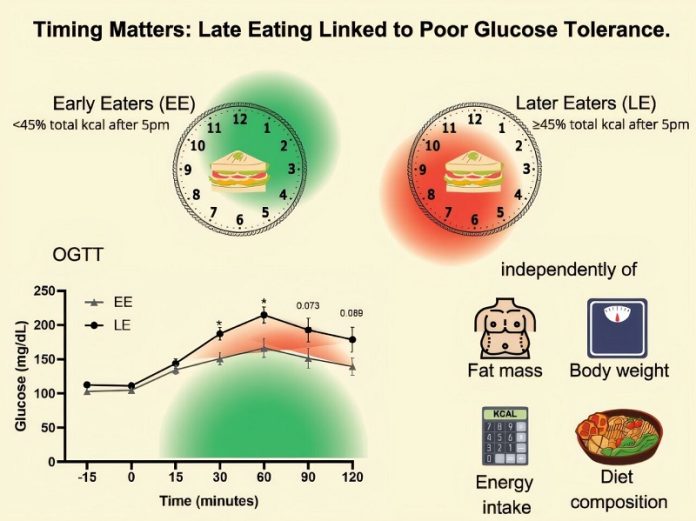
We’ve often heard that eating an early, light dinner is better for health, and now science backs it up.
A study by researchers from the Universitat Oberta de Catalunya (UOC) and Columbia University has shown that consuming more than 45% of your daily calories after 5 p.m. can raise glucose levels, with serious health risks.
This is true regardless of your weight or body fat.
The research, published in Nutrition & Diabetes, highlights how eating most of your calories late in the day can increase the risk of developing type 2 diabetes, heart problems, and chronic inflammation.
High glucose levels over time can damage blood vessels and worsen overall health.
Dr. Diana Díaz Rizzolo, a researcher from UOC and Columbia University’s Irving Medical Center, led the study. She explained that the body’s ability to handle glucose is naturally lower at night.
This is because insulin, the hormone that helps process glucose, is less effective during evening hours. This effect is linked to our circadian rhythm, the body’s internal clock that aligns with daylight and nighttime hours.
Early eaters vs. Late eaters
The study involved 26 participants aged 50 to 70 who were overweight or had prediabetes or type 2 diabetes.
The participants were divided into two groups: early eaters, who consumed most of their calories before the evening, and late eaters, who ate 45% or more of their daily calories after 5 p.m. Both groups consumed the same foods and the same total number of calories, tracked in real time using a mobile app.
The findings were clear: late eaters had poorer glucose tolerance compared to early eaters. This means their bodies were less effective at processing sugar, even though their diets were identical. Late eaters also tended to eat more carbohydrates and fats in the evening, adding to the problem.
Why timing matters
Eating late disrupts the body’s natural rhythm, leading to reduced insulin secretion and lower sensitivity to the hormone. This makes it harder for the body to handle glucose at night, increasing the risk of health issues.
Dr. Díaz Rizzolo emphasized that the timing of meals is just as important as what and how much we eat. To improve health, she recommends eating most calories during breakfast and lunch, while keeping dinner light. Avoiding ultra-processed foods, fast food, and carbohydrate-rich meals at night is also crucial.
This study highlights how shifting our eating habits earlier in the day can make a big difference in long-term health.
If you care about wellness, please read studies about how ultra-processed foods and red meat influence your longevity, and why seafood may boost healthy aging.
For more health information, please see recent studies about the power of pickle juice ,and time-restricted eating: a simple way to fight aging and cancer.



